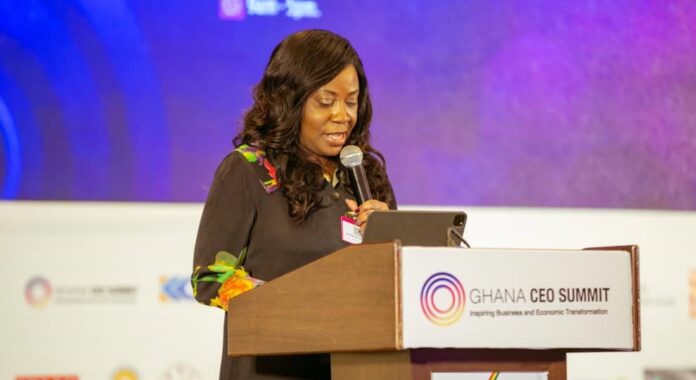
Ing. Patricia Obo-Nai, Chief Executive of Telecel Ghana, has advocated for the strategic integration of Artificial Intelligence (AI) in business to drive economic diversification. Delivering the keynote at the 8th Ghana CEO Summit last Monday, where she was awarded CEO of the Year in the telecommunications sector, she shared insights on the pivotal role of AI in propelling economic expansion.
“As CEOS, we have a responsibility, irrespective of the sector to adopt AI technologies to drive productivity, unlock new opportunities and protect our market relevance and positioning,” she said. We all need to support the diversification of our economy through our various sectors.”
Reflecting on Telecel Ghana’s evolution from its roots to the current status as a leading provider of combined mobile, fixed, tech and financial services, Ing. Obo-Nai said the telecommunications industry is the backbone of the global digital infrastructure therefore, deploying AI to fast-track service delivery, improve customer experience, and stay ahead of the curve is key to the survival of the industry and the country.
Sharing practical examples of how Telecel Ghana has embraced AI head-on, Ing. Obo-Nai said fostering a culture of digital awareness and prioritising agile working culture within Telecel has helped to embed advanced digital technology across its operations.
Telecel Ghana has ingrained AI and machine learning in their product design system to create tailored data and voice packages for customers. The systems learn each consumer’s behaviour such as their data and airtime usage to recommend personalised packages that align with their purchasing power and usage history. Additionally, the telco is using AI to predict credit worthiness of customers, credit limits and likelihood for repayment before issuing airtime in advance or loans via their mobile money platform, Telecel Cash.
Ing. Obo-Nai also championed cross-sector collaborations as a means of harnessing AI’s potential to drive broader economic growth. She mentioned that one way of ensuring that AI becomes a benefit to the economy is to promote cross-sector collaborations such as the work Telecel Ghana is currently doing with the energy and extractive sector to digitise utility monitoring, remote asset checking and real-time system maintenance among others.
In advocating for AI adoption, Ing. Obo-Nai stressed the importance of responsible and proper use of AI technology. She advised leaders to set ethical guardrails and institute policies to prevent the technology from being abused by navigating the complexities of regulatory frameworks, addressing concerns surrounding data privacy and security, and ensuring that the benefits of AI are equitably distributed.
Remarking that AI should amplify and not replace human intelligence, Ing. Obo-Nai concluded with a call to action for fellow business leaders, urging them to embrace AI as a tool for operational efficiency and economic diversification. “This future is not a distant dream – it is within our grasp, waiting to be realised through bold leadership and strategic investment in digital innovation. Think AI, use AI,” Ing. Obo-Nai said.
The 8th Ghana CEO Summit was on the theme ‘Reigniting Business and Economic Growth: Charting a Path Forward; Economic Diversification and Artificial Intelligence Transformation. A Private-Public Sector CEO Dialogue& High Impact Learning’. Since its inaugural edition in 2016, the summit has brought together CEOs, heads of state, entrepreneurs, and industry leaders from across West Africa and the globe to explore solutions for economic growth and development.









